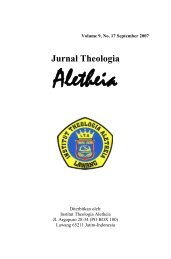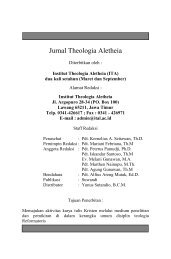download - Sekolah Tinggi Theologia Aletheia Lawang
download - Sekolah Tinggi Theologia Aletheia Lawang
download - Sekolah Tinggi Theologia Aletheia Lawang
Create successful ePaper yourself
Turn your PDF publications into a flip-book with our unique Google optimized e-Paper software.
38<br />
done the will of the Father (Matt. 7:21-23). Obedience is the key<br />
concept providing the difference.<br />
This may be understood as minimizing the importance of<br />
religious ritual or of superficial religiosity. Dutifully and<br />
deferentially intoning the Lord‘s name or participating in<br />
appropriate religious ceremonies has no benefit unless it is<br />
anchored in genuine faith that expresses itself in joyful and willing<br />
obedience. This is congruent with Old Testament examples such<br />
as Samuel‘s stern rebuke of Saul as he returned victoriously from<br />
defeating the Amalekites: ―Has the Lord as great a delight in burnt<br />
offerings and sacrifices as in obeying the voice of the Lord?<br />
Behold, to obey is better than sacrifice‖ (1 Sam. 15:22). 30 Jesus<br />
says the one who does the will of the Father is accepted—that it is<br />
by their fruit you recognize who the true believers really are (Matt.<br />
7:20).<br />
The Christian who is being conformed to the righteousness<br />
of God, therefore, must try to bring his or her life into conformity<br />
with God‘s law as revealed in the Bible. That alignment includes<br />
one‘s thoughts and feelings as well as actions. Christians who love<br />
God also love his law. His commandments are no longer<br />
burdensome but a source of joy and satisfaction (1 Jn. 5:2-3). If<br />
you love God, then nothing makes you happier than doing what<br />
delights him. If you really want to obey God and keep his<br />
commandments, you must go beyond superficial compliance to a<br />
genuine understanding of the intent of each commandment. Once<br />
you understand that intent, you may begin to bring your life into<br />
alignment with it. The Pharisees‘ problem was that, while they<br />
appeared to be enthusiastic and sincere about obeying the law, they<br />
used words to construct their own code of conduct, a code that<br />
often missed the true intent of God‘s law. Rather than being the<br />
most zealous keepers and perpetuators of the law, they were<br />
30 Cf. also Leviticus 10:1-3; Isaiah 1:10-17; Jeremiah 6:19-20, 7:21-26; Hosea<br />
6:6.




